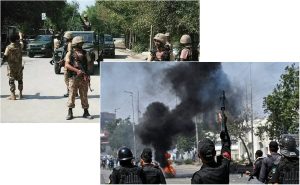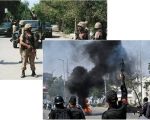DOHA/ISLAMABAD – As tensions continue unabated between Pakistan and Afghanistan, Border posts burned, troops fell, , and it seemed another round of violence was inevitable but both sides reached historic ceasefire deal, bringing an abrupt halt to weeks of deadly cross-border fighting that left scores dead on both sides.
The agreement, brokered late Sunday by Qatar and Turkiye, is being hailed as a major step toward restoring peace in one of the world’s most volatile regions. Officials in Doha called the deal a “foundation for lasting stability” between the two uneasy neighbors.
Islamabad and Kabul committed to an immediate ceasefire and to establishing a permanent mechanism for peace and security along their 2,500-kilometre border, a rugged frontier long plagued by terrorism, smuggling, and insurgent activity. “Both parties agreed to an immediate cessation of hostilities and to create mechanisms that ensure long-term peace and stability,” the Qatari statement declared, calling the deal “a turning point for regional security.”
The truce follows dramatic escalation earlier this month when Taliban fighters and India-backed TTP militants launched a deadly unprovoked assault on Pakistani border forces on October 12.
Pakistan’s military struck back with massive counterattacks and precision airstrikes inside Afghanistan’s Kandahar and Kabul provinces, killing over 200 militants and destroying multiple strongholds. The clashes left 23 Pakistani soldiers martyred, according to the Inter-Services Public Relations (ISPR).
Leading Pakistan’s delegation, Defence Minister Khawaja Asif confirmed the breakthrough, calling it “a new dawn of peace and stability in the region.” He announced that the next round of talks will be held in Istanbul on October 25, adding that both nations had pledged to respect each other’s territorial sovereignty and end cross-border terrorism immediately.
Defence Minister said Pakistan agreed to turn the page and there will be no more bloodshed. No more attacks from Afghan soil, he declared.
Islamabad delivered a clear warning during the Doha negotiations: the presence of militant sanctuaries in Afghanistan is unacceptable.
In recent weeks, Pakistan’s forces have also carried out high-precision strikes on Gul Bahadur group hideouts in North and South Waziristan, killing 60–70 militants, while over 100 members of the Khawarij group were neutralized in separate anti-terror operations.
The ceasefire could mark the beginning of a new chapter in Pakistan-Afghanistan relations — or merely a temporary pause in a decades-long conflict.
Since the Taliban’s return to power in 2021, Pakistan has endured a surge in cross-border terrorism, especially in border regions. Islamabad has repeatedly urged Kabul to prevent groups like the banned TTP from using Afghan territory to launch attacks.














